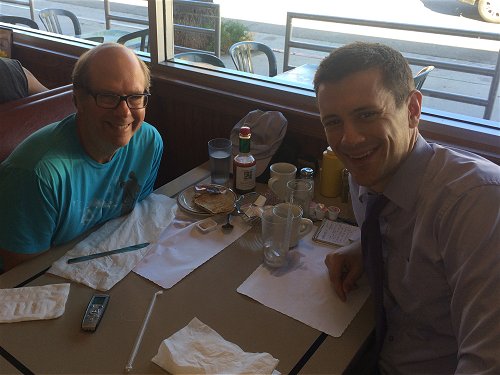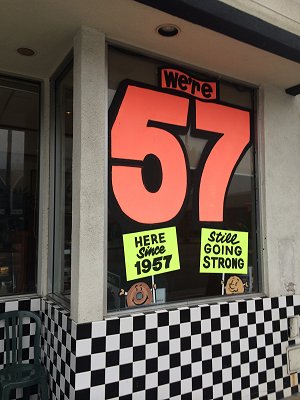SHERMAN OAKS, CALIFORNIA
October 13, 2014
STRANGER: Stephen Tobolowsky
LOCATION: Art’s Delicatessen, 12224 Ventura Boulevard, Sherman Oaks, California
THEME: Breakfast with a character actor/storytelling writer
Ned? Ned Ryerson?
It’s impossible not to immediately think of the over-eager insurance salesman from Groundhog Day when first meeting Stephen Tobolowsky, who played Ned in the movie. Although it came out in 1993, Stephen today — standing at an impressive 6 foot 2 inches — still looks as enthusiastic and approachable as the character who smothered Bill Murray’s Phil Connors with friendship.
He doesn’t mind people recognizing him from Groundhog Day, the Harold Ramis-directed comedy in which weatherman Phil Connors is stuck living the same day over and over and over, including constantly running into his old high school acquaintance Ned.
“I love the movie. I think it’s a brilliant script. I never get tired of seeing it. And I love Ned. He’s a great character,” Stephen said as we sat down to breakfast.
“This is a great place, people have had show-business meetings here for decades,” said Stephen as he scanned the menu at our venue, Art’s Delicatessen in Sherman Oaks. It was sparsely populated for the early morning, leaving a massive expanse of unoccupied dark leather booths and rows of tables. We were seated at a table by the window, watching the sunny early hours pass by on Ventura Boulevard.
During the two-plus hours that Stephen and I shared at that table, I saw him laugh, shed a tear, throw his arms out as he told a captivating story from his life, and sit in silence as he pondered deep philosophical questions. Spending time with him is to experience a tour de force in human emotion.
It would seem natural that Stephen, who’s been an actor for decades, would be able to portray such a wide range of reactions. But he wasn’t acting. He was just showing his skill for storytelling, which more recently he’s been putting to good use in a series of podcasts and writing. That’s where his passion lies these days, and eventually our conversation moved on to discussing his new book The Dangerous Animals Club, a collection of his often humorous, touching, life lessons.
He sees life as a series of “adventures” and tries to explain that through his writing. Similarly, it was the desire for adventure that first got him into an acting career.

As Stephen tells it in The Dangerous Animals Club, he wound up with a passion for acting by mistake. At high school, he was playing a piano recital that involved moving his hands further up the scale to the right of the instrument. Eventually, he went too far and took a tumble on to the stage. In an instant of quick thinking he stood and took a bow. The audience loved it. He loved the reaction. From then, he knew he wanted to be an actor.
But he traces the actual seed of acting back to when he was about five years old, growing up outside of Dallas in rural Texas. “That’s when I think I first wanted to be an actor. I thought actors had adventures. I wanted to have adventure in my life. I wanted to fight in wars, fly in planes, and be on pirate ships or battle monsters. I thought it was all real.”
He studied at Southern Methodist University in Dallas before attending the University of Illinois where he received a Masters of Fine Arts in Acting. After that, his early career focused on stage work before he started to win roles in films. Jump cut to the present day and he’s got a seemingly endless resume with roles in a host of well-known movies such as Groundhog Day, Sneakers, and Mississippi Burning, and television appearances on shows including Deadwood, Glee and Californication among many others. Not a bad career for someone just looking for adventure.
In a collection of his podcasts called Cautionary Tales, Stephen floats the philosophical question of why do we do what we do? I asked him why he keeps acting.
“It must be for the adventure. I don’t need anything to help my resume. I don’t need to work my way up in my career. I’m one of those character actors that people call to say, ‘Can you make this part work or can you make it funny?’ For me, it becomes about experience.”

He also embraces the label of character actor, as it gives him much more range than a leading role. “There’s always the chance that I’ll get that Paris, Texas leading role that Harry Dean Stanton had,” said Stephen, referencing Stanton’s lead role in that movie. “But that may not happen. And instead of one leading role, I end up doing 15 to 20 jobs a year.”
Being a character actor is akin to being a detective, Stephen said. “And that aspect is what thrills me about doing it. The leading actor is carrying the entire weight of the story on their back, and that’s a terrible job. As a character actor, you have to put the pieces together — how you know this information that the leading character doesn’t know, and how to impart that to them.”
By example he cited his experience as Stu Beggs on Californication, a television show that starred David Duchovny as a hard-drinking, womanizing novelist. Stephen’s character of Stu was a Hollywood producer known to be particularly well-endowed. As a supporting character, Stephen said he got to enjoy all the perks of the show without the burden placed on the lead.
“What a spectacular and incredibly difficult job David did. Wow. 15 hours a day with no break, having to carry everything on his back. Then I get to be Stu and have this huge penis and have girls and cars and money, and have all these fun scenes and go home. It is completely satisfying to do it and you get to play a lot more roles when you are a character actor,” he said.
One downside is that unlike leading actors, character actors have less job security. “So you have terror because of that, but fear is a great motivator,” Stephen added.

As our waitress brought our libations — coffee for both of us, with orange juice as well for me and an iced tea for Stephen — I asked him how his roles have changed over the years.
He said it’s tied directly to his age (he’s now 63). “I used to be the sidekick. Then I got too old for that. Then it was the boss. Now I’m too old for some of the bosses,” he said, laughing. These days he’s seeing more roles offered to be a professor or rabbi or grandpa. “I got my first audition script last year that only had the name ‘Grandpa’ on it. I thought, ‘Oh my god. It’s happened.’”
His age also influences how he approaches a role. He explained how it’s not just another job to him. Stephen invests in a character, and doesn’t agree with acting in a way that wouldn’t seem true. That can cost him roles, but he’d rather do that than something he doesn’t believe in.
A few years ago he auditioned for a role in a project where Geena Davis was to play a bounty hunter, and Stephen’s character would be an accountant at Davis’ firm. The writers made his character have a crush on Davis, turning him into a shy, fumbling guy who couldn’t speak whenever she was around. But something about it didn’t sit right with Stephen. “I went to the audition and I said, ‘Guys, I’m like 60, is there any point in time where I’m not going to be scared of women?’”
It didn’t jive for Stephen that his character would still be so inept around a crush. “I know my way around a vagina,” he said, chuckling. “It doesn’t bother me anymore. I sat beside my wife when she had a Caesarean section and saw her cut open, her insides on a towel. At a certain point in life you’re not scared of a vagina anymore. Once that happens, you can’t play those parts.”
He added, “I also think I lose parts now where I have to be a romantic kind of character because I’m too saggy now, the audience just doesn’t want it with their seniors.”

That doesn’t mean he’s still not inundated with work. He said it’s a 50/50 split between being offered gigs and having to audition, and he keeps busy with acting. When we met, he was filming a role as a director in a Chinese production filming scenes in Los Angeles.
“What I’ve learned is that I like auditioning because you get to know the people you’re working with, and you can really embrace the material. Sometimes I don’t embrace it and I tell them it would be better if I didn’t play this part. I know I will get some other part down the line anyway,” he said.
“What fills me with the greatest dread where they offer me the part and I don’t have to audition,” he said. Having to live up to expectations is daunting, he added. “They see me as a certain product. I have to live up to expectations. It’s terrifying.”
Nevertheless, he’s shown what observers would surely see as bravado when auditioning for roles. Take the time he was up for a role in Michael Mann’s move The Insider. Mann was incredibly secretive about the script, refusing to divulge much about Stephen’s character, his motivation, the context of his dialogue, or even what he was doing in a scene.
That wasn’t going to work for Stephen. “I said to Michael Mann, what if I told you I wanted you to direct a movie, but wouldn’t tell you the stars, the budget, the historical time frame or the start date? You’d say, ‘Go fuck yourself.’”
As Stephen tells it, Mann started laughing and let him read the script — after signing a strict confidentiality agreement. “I came back and knew who these characters were. I read for three parts and got one of them. But that wasn’t really ‘brave’ of me. It was more about where I saw my consequences. I didn’t have a part already, so didn’t see losing a role as a consequence. All I saw as a consequence was going in and undercutting my ability to do my best work. How can I have a good audition when I don’t know who I am because they won’t give me a damn script?”

Although his approach worked for winning a role in The Insider, he says the secretive script dilemma continues in Hollywood, in particular on TV shows worried about leaks.
With just fragments of a fuller script, Stephen often has to go with whatever he can get. “All you can do is be a friend to yourself and your creative side. You listen to the little voice in your head and give yourself a chance at succeeding,” he said. “You bring whatever truth you can to a role.”
Stephen maintains that approach whatever the role, including working with animals like he did in Garfield or working with children in various movies. “You know whatever you do is going to be wiped off the screen by puppies or the kid. You have to always bring your truth to the role because when the dog or the child gets their performance right, that’s the scene they’re going to use.”
Acting to an extent is like a sporting game, seizing up the opponents, figuring out the long play, Stephen said. And that analytical, competitive approach to acting has been an apparent constant in his life, and also influenced his role as Ned in Groundhog Day. Stephen admits to nerves for his first scene opposite Murray, where Ned runs into Phil on the streets of a small town.
At the audition, Stephen acted his lines opposite Ramis standing in as Phil. “I said I was going to act Ned big and broad, and Harold said to do whatever you want. I almost attacked him! I was all over him, and he was laughing so much he couldn’t really say his lines.”
When it came time for the first scene with Murray — who was also physically imposing, as he’s taller than Stephen — Ramis offered some more advice. “He said that Bill is the stew, and you’re the spice in the stew. So you can do anything. Go crazy on Bill. He gave me real permission to do that,” Stephen said. And that plays out on film, with Ned’s over-the-top personality at first smothering Phil.

Stephen recalled how English novelist George Meredith said comedy only works when there is civilization. “Someone in a scene has to carry civilization. If you have two people trying to be goofy, it doesn’t work. So I went in to my scene with Bill assuming he was going to be civilization, the everyman in that scene. And he let me be crazy, and took me in, and then counter-punched as civilization.”
He also used his lessons from a former acting teacher Ed Martin, who said that actors should always approach a role asking what is their character’s greatest hope and greatest fear. “As Ned, I was thinking that one of my biggest hopes is to have my old buddy Phil Connors like me, and to go full forward. Any condescension only fed to me wanting to please him more,” Stephen said.
As the movie progresses, Murray’s character becomes a little more unhinged and his humor becomes more prominent. He turns into the spice in the stew. “Bill is able to switch in out between straight man and comedic man without anyone recognizing it, which is very hard to do,” Stephen said.
Stephen’s approach in Groundhog Day worked well for a one-on-one scene. But I wondered whether the method is the same when working in an ensemble film or TV show.
“Yes,” was his short answer. One notable production that Stephen was involved in was HBO’s Deadwood, set in the American Frontier with a massive cast of character actors. In those situations Stephen said his plan is to approach it as if he were part of a string quarter. “I’ll go on set and assess my role. I am the bass note? The violin? Then I’ll watch what the other actors are bringing to it. Are there too many violins? How do I get in a place where my voice will be heard?”
After we placed our orders with our friendly waitress, Stephen told me that he’s got fond memories of Deadwood. The show was canceled after its third season, and he said “I think it’s just too difficult to bring everyone together” again for a wrap-up season or movies. Another hurdle might be the high production values of the show. It featured a detailed set of an old Wild West town, where the walls of the buildings were insulated with facsimiles of 1880s newspapers. Such attention to detail can make it much easier to find the role in the string quartet, he said.

Other times, he relies on what the other actors are doing to make sure the quartet is playing in harmony. He was recently on The Goldbergs, playing the principal of a high school. One option was to play the role as a screaming alarmist, the other as a straight-faced voice of reason. Noticing that the other characters were high energy and hilarious, he decided that the best approach would be the dour one. “It played better comedically,” he said.
“You make that choice in the moment when you find where your character can live,” Stephen said.
It’s an approach he’s now trying to teach others through improvisation classes, but focusing on acting improvisation rather than comedy such as the work done by Los Angeles-based improv group The Groundlings. Another character actor, Michael Hitchcock, told me in a recent interview about his work with The Groundlings. But Stephen said his teaching is a different style.
He explained that often during filming, directors will need actors to fill 30 seconds to a minute with unscripted improv to allow for a particular camera change or other process. “And I teach ways to make that work,” Stephen said, noting improv must be in-keeping with how a character would truthfully behave.
On the Chinese production where he’s playing a director, he said the character is prone to bursts of anger. His wife has been cheating on him. He explodes during a day on set, venting about his personal life. While this is going on, the real-world director told Stephen they needed to fill some time to change cameras. So, improvising, Stephen jumps on the back of a cart on the set, making the driver move it forward and back, all while yelling about his private life traumas.
“Back it up! Back it up!” yelled one of the fake crew members.
“Oh yeah, that’s what she said!” Stephen’s director would sarcastically quip.
That’s a brief example of using improvisation to fill time on set, he said. And it’s what he offers at his class, where his students range from young actors “trying to climb up Mount Doom in Hollywood” to police, gardeners, construction workers, and retired women who got improv classes as a birthday gift. “The mix of people I have now is inspiring,” he said.

Although his time is now taking up with teaching and writing in addition to performing, he’s still having adventures in acting — including the Chinese production.
One scene called for blowing up a large building while Stephen stood with his back to it, barking instructions to the fake cast and crew. The real crew was hidden behind a safety wall, whereas Stephen was on the other side as the cameras rolled. “I asked the effects guy whether I would be okay, and he said, ‘You’re probably going to be fine.’”
Boom! The building blew up. Glass and wood flew in the air. “I felt this enormous heat and rush of air behind me going over my head. It was hysterical. But then I had to go forward and give my next line, which was, ‘Who said it was okay to blow the building up?”
Afterward the real director ran up to Stephen and congratulated him on his performance under pressure. “He said, ‘I was terrified for you,’” Stephen laughed.
Despite the terror of having a building explode just feet away, he described it as one of many of his adventures in life. But he also highlighted how the types of adventures he’s looking for have change. He’d rather get the adventures through his writing work. The book The Dangerous Animals Club and his regular podcasts have seen him travel the world to share his storytelling.
Stephen said that while he hadn’t always written throughout life, he’s always been taking notes. He’s got “boxes and boxes” of them stashed away at his house in Los Angeles, which he shares with his wife Ann (the couple has two sons).
Years after he wrote that note, Stephen read writings by famed theater teacher Constantin Stanislavski, who also described a magic in the fire between the actors and the audience. “It made me realize that maybe these ideas are passed through time,” he said, hinting at some of the thoughts of interconnectedness of life that he’d elaborate on when we talked later on about his writing.
But before we switched gears to focus on discussing his writing, Stephen said that his ongoing acting career is now influenced by his growing love of the written word.
Nowadays he’s not bashful about suggesting changes to particular words when a single word might change the context of a scene. Notice the slight change in these two lines:
“I don’t feel that I like what you just said” — here the character is acting as an instinctive person, based off their emotions.
“I don’t think that I like what you just said” — here the character is acting as a cognitive person, a more thoughtful approach.
Such parsing of language might seem inconsequential, but Stephen said it affects how he plays a role. “I find that words mean a lot more to me now, and I want to be as truthful as I can to the words on the page,” he said. “That’s why I have trouble acting now because I don’t have a lot of trust in scripts. My writing means I want to pick better words in scripts.”
That doesn’t mean he thinks he always knows best. He says it’s much better to always be a student in Hollywood, rather than a master. “It’s always better to assume you have to learn something, otherwise you just ossify and you don’t grow,” he said.
As our waitress arrived with our breakfast, Stephen thought about the two career paths of writing and acting. Then, as he picked up his knife and he fork, I asked what he’s most interested in doing.
“I would rather just write, but it’s hard to make a living doing that,” he said.
Click here for part two of my interview with Stephen, focusing on his writing career and why he agreed to have breakfast with a stranger.
hexthc
atp0d2
kfvg4g